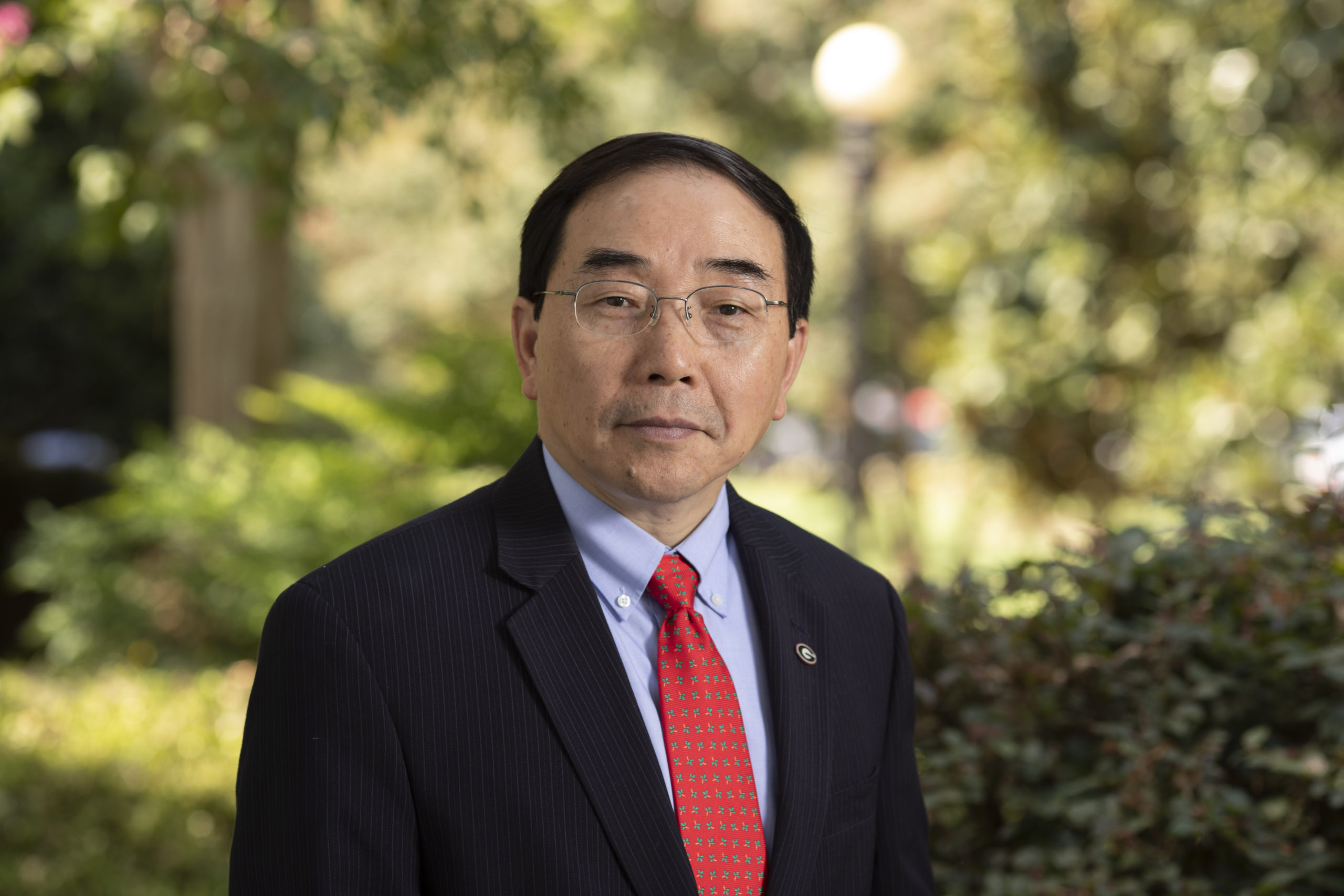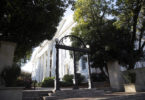In the corner of Provost S. Jack Hu’s office in the Administration Building, just to the right of the window overlooking North Campus, is a framed print of elegant Chinese calligraphy. It includes Chinese characters “kaizen,” as well as the names of cherished colleagues and mentors. “Kaizen” is a manufacturing approach that prizes continuous improvement. Hu, an engineer by training, began his tenure as the University of Georgia’s chief academic officer on July 1. He recently sat down to discuss his thoughts on fostering continuous improvement at the birthplace of public higher education in America.
You were at the University of Michigan for nearly 35 years, most recently as vice president for research. What attracted you to the University of Georgia? This morning I was meeting with some faculty and administrators, and I thanked them and told them that they all played a role in bringing me to the University of Georgia. This institution has risen so rapidly, and that’s because of the faculty, staff and leadership here.
Fortunately, the weather played a role, too. I’ll explain how: When the search firm called me, I showed some interest but also was a little reluctant. Then we had a two-day shutdown in Ann Arbor due to the polar vortex, so for two days I didn’t go into the office. I used that time to do some homework on UGA. I recognized the reputation of the university, particularly in undergraduate education, but also the aspiration of the faculty and leadership in wanting to achieve greater recognition and excellence in graduate education, research and service. I thought Georgia would be a great fit given my interest in building research, and the momentum and great reputation that we have in instruction and outreach.
What are some of the core values that have guided your career? As a faculty member, the key is transforming people—transforming students, that is. I think the training of graduate students through mentoring in research and scholarship makes them more informed and helps them to become thoughtful and engaged citizens. The same is true for undergraduate education. I think the four years that an undergraduate student goes through in college are transformational.
As a leader in higher education, my core value is service. Service leadership, supporting faculty, staff and students and making sure that they are empowered.
What do you want faculty and staff to know about you in your role as provost? The provost sits at an interesting intersection. The provost represents the academic, faculty perspective but also has an administrative responsibility. I see my role as supporting faculty and am, myself, a faculty member. So, it’s important for me to communicate closely with the faculty, the students and the staff and to make sure that they are heard and supported. This is for the benefit of students and for the benefit of the institution.
Tell me about your priorities for academics at the university for the coming year. I’m still learning, and it will take time for me to fully understand the university and the aspirations of the faculty, the staff and the leadership. Based on my initial understanding of the institution, a number of areas will remain very important, like continuing to strengthen undergraduate education. We’re already highly ranked, but we need to continue to strengthen this area for our students. That includes enhancing experiential learning and making sure that students have opportunities for engaged learning, whether through internships, research, service-learning or global learning and partnerships. All of those are important areas for students.
In research, I think it’s important to build our reputation as a global research university with impact. Research is done by faculty and graduate students, so we need to strengthen graduate education and recruit the best faculty to UGA, mentor them, and keep them here at the university.
It’s also important that we continue to strengthen innovation and entrepreneurship. I think building a culture of risk-taking—trying things that are a little unconventional—is important for faculty and students. Faculty researchers have to be at the cutting edge, and they should be encouraged to explore different research areas or educational approaches and curricula. In terms of entrepreneurship, that means taking an idea and moving it to the marketplace. That involves risk, also. You may start a company and have it fail. But tenured faculty should not be worried if they try something different and their company fails. That’s what risk-taking is all about.
And how do you effect change at an institution as large and complex as the University of Georgia? Effecting change is not easy, right? UGA has a long history. We have systems and operating procedures, but I think change is about creating a culture. Fostering a culture of service, a culture of leadership, a culture of risk-taking, and a culture of continuous improvement. All of those are important.
On a personal note, what do you enjoy doing in your free time? I picked up the game of golf a few years ago, so I try to get out on a golf course on the weekend when I can. I grew up in China, so I appreciate Chinese literature and Chinese calligraphy. So usually in the wintertime when I was at Michigan—you can’t get out, right?—practicing calligraphy was something I enjoyed. I have the brush pens and ink, but they’re still in moving boxes now and I hope to get them out soon. My wife is a pianist, and I enjoy going out with her to concerts and performances.
Is there anything else you’d like to add or say in summary about your role as provost? The provost is the chief academic officer, so academic excellence is my priority. We should strive to be the best in education, in research and in service. I mentioned earlier our momentum in instruction and research, and UGA is exemplary in outreach. Among all the public institutions that I know of, UGA does an exemplary job in service and outreach.
We have to tell our stories to the citizens in the state, across the U.S. and beyond. Our story is about the value of higher education and how it transforms students. We need to tell the story of what our research and services provide for the state in terms of economic impact. We need to keep telling these stories so that alumni, donors, foundations and elected officials will continue to support the University of Georgia and higher education in general.






